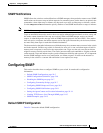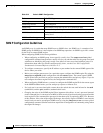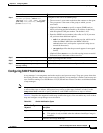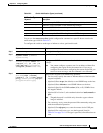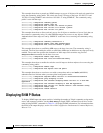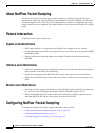
54-13
Software Configuration Guide—Release 15.0(2)SG
OL-23818-01
Chapter 54 Configuring SNMP
Configuring SNMP
You can use the snmp-server host global configuration command to a specific host to receive the
notification types listed in Table 54-3.
To configure the switch to send traps or informs to a host, perform this task:
tty
Generates a trap for TCP connections. This trap is enabled by default.
vlan-membership
Generates a trap for SNMP VLAN membership changes.
vlancreate
Generates SNMP VLAN created traps.
vlandelete
Generates SNMP VLAN deleted traps.
vtp
Generates a trap for VLAN Trunking Protocol (VTP) changes.
Table 54-3 Switch Notification Types (continued)
Notification Type
Keyword Description
Command Purpose
Step 1
Switch# configure terminal
Enters global configuration mode.
Step 2
Switch(config)# snmp-server
engineID remote ip-address
engineid-string
Specifies the engine ID for the remote host.
Step 3
Switch(config)# snmp-server user
username groupname remote host
[udp-port port]
{v1 | v2c | v3
[auth {md5 | sha} auth-password]}
[encrypted] [access access-list]
Configures an SNMP user to be associated with the remote host created
in Step 2.
Note You cannot configure a remote user for an address without first
configuring the engine ID for the remote host. If you try to
configure the user before configuring the remote engine ID, you
receive an error message, and the command is not executed.
Step 4
Switch(config)# snmp-server host
host-addr
[traps | informs]
[
version {1 | 2c | 3 [auth | noauth |
priv]}] community-string [udp-port
port
] [notification-type]
Specifies the recipient of an SNMP trap operation.
• For host-addr, specify the name or Internet address of the host (the
targeted recipient).
• (Optional) Enter traps (the default) to send SNMP traps to the host.
• (Optional) Enter informs to send SNMP informs to the host.
• (Optional) Specify the SNMP version (1, 2c, or 3). SNMPv1 does
not support informs.
• (Optional) For Version 3, select authentication level auth, noauth, or
priv.
Note The priv keyword is available only when the crypto software
image is installed.
• For community-string, enter the password-like community string sent
with the notification operation.
• (Optional) For udp-port port, enter the remote device UDP port.
• (Optional) For notification-type, use the keywords listed in
Table 54-3 on page 54-11. If no type is specified, all notifications are
sent.



